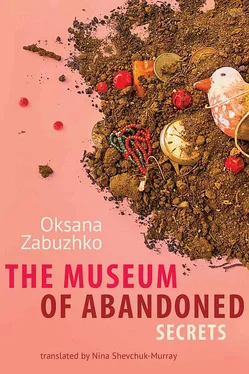“Of course,” Antosha agrees.
“I promise you. Even if no one ever buys it—you’ll show it to your kid.”
And Daryna will show it to Nika Boozerova. And Katrusya, she must see it—even if she’s too young to understand, she’ll remember it. When she grows older, Daryna will explain. They grow up so quickly! Children—those living clocks and all we can do is try to earn their forgiveness at some point in the future. And this person who will come (a girl? with tiny blonde braids?)—how will Daryna look her (him?) in the eye when they meet if she doesn’t make this? Her film. And Antosha, he is right: the film is his, too, and not only because he worked on it. It was Antosha’s eye, always, no matter how hungover, that unerringly found the best angle, that was hiding behind the camera during every one of those twenty-four hours—Vovchyk, her show’s director, had also done a ton of work on this, but what happened to his work has always been, for Vovchyk, “not his problem.” He didn’t have any trouble letting his employers have the final word about that. Antosha has not betrayed his work. He just hasn’t, and that’s it. Is this what Aidy, when he’s appraising all that antique workmanship, calls, with such purely masculine, guild-like pride (we women can never quite say it the same way)—a master?
“Of all the shit to worry about right now, why would you pick whether anyone’ll buy the thing?” the master grumbles. “I was just so happy, you know, when I heard you got the footage out of there. Good job, Dara, I thought, you stick it to those bitches… ’cause I’m telling you I’ve had it with them. You know me—I’m basically an ox: you can hitch me to the plow forever, and I won’t even moo; I’ll just swish my tail at the flies… the Ukrainian temperament, we’re all like that. Until they bend you beyond the breaking point. And then it’s the end of the line: the ox stops and you can forget your plowing. If you’d just told me you already had someone else lined up, I would be quitting the studio anyway. I’d go wherever, to hell and back, doesn’t matter. ’Cause what these bitches are cooking up there, it’s fucked up, I’m telling you. And the people have no idea, they don’t get which way the wind’s blowing.”
“You did. And I did. And I know others who did. And how many are out there that we don’t know about? It’s a big country, Antosha. They can’t just bend it however they want.”
“I’m sorry about Diogenes’ Lantern ,” Antosha suddenly says. “Real sorry.”
“Uhu.”
“You were holding it, you know. The lantern. And one could see there were people in this country…. And now all you see is shit crawling out from the woodwork and nothing else. Why should it be so, Dara? Why are they always putting us down? All the time, look at any time in history, it’s the same thing all over again—someone’s stomping us into shit, so deep we can’t even see ourselves. Is that some fucking karma we got, or what?”
“Devil’s Playground,” she recalls. “That’s how someone put it to me recently. I mean, he said God’s, but it’s actually the Devil’s: he’s one of those people, you know, for whom these concepts are interchangeable, God-Devil, up-down, left-right… depending on the situation, what kind of a hand they get.”
“Uhu, and they seem to be fucking everywhere… and what are you gonna do about it, huh?”
“Make a film,” Daryna says. “Make a film, Antosha. What else would we do?”
* * *
It will be a film about betrayal, she tells Adrian when they are walking back through Tatarka from the restoration workshop. Daryna asked to come with him to see how they cleaned old icons.
“About betrayal? But we still don’t know the identity of the man who led the raid to the bunker; we only have our speculations—so whose betrayal, which?”
“Any. Of one’s country. Of love. Of oneself. Betrayal as a road that leads to death, but we’ve talked about that already—someone has to pay for every betrayal, one way or another, to restore the cosmic balance of forces that it violated. The greater the betrayal, the greater the sacrifice.”
“So when are you starting?”
“Tomorrow. I invited Antosha to have dinner with us, to discuss the changes to the script, he might think of something—there’re three of us now! There were three of us anyway. Without Antosha. Well, the little one hasn’t made the team yet.”
“Is that why you turned the place upside down today—you were going through your stuff?”
“Yes, and you know what I found? On my dictaphone, remember, it kept rolling in my purse on the way back from fishing with Boozerov, it recorded our entire conversation—at the very beginning, there’s a bit of Pavlo Ivanovych talking.”
“For real? How could that have happened?”
“Beats me—maybe the button got pressed, inside my purse, all the way back at the river, when he kept trying to send all that fish home with us. You can’t hear exactly what he is saying, so it’s just this irritating drone, as if from behind a wall, boo-boo-boo , persistent, like it’s trying to break through and just can’t, and it’s just the timbre and the intonations, nothing else; and you know, it gave me such a strange feeling, this voice, distilled like that to the pure essence of sound—as if I had heard it before, the same intonations, they were so dreadfully familiar, as if they belonged to someone very close… I’m not making this up, trust me. I didn’t even have it in me to erase that bit, even though it’s nothing to do with anything. And you know how it ends, the recording? With your voice—you asking what if I were pregnant. The first time you mentioned that. So weird…”
“Adrian shrugs: What’s so weird about it?”
“I don’t know,” Daryna slowly answers, thoughtful, as if still under the spell of that other voice—“I must be getting superstitious.”
They stop at a crosswalk. In the openings between buildings, the dusk, already pricked with streetlights, smoldering, bluish and ashen; the windows of the top floors flash with every shade of fire; and, in the dusk pooling below the red signals at intersections, the taillights of passing cars glow mysterious and sweet, like pomegranate seeds.
“Look.” She touches his elbow.
“At what?”
Look at how magnificent the city is in this light, she wants to say; this is the only time when you can sense its rhythmic breathing—when all the dirt people tracked in during the day is extinguished by dusk, and even the noise seems muffled, like when you instinctively lower your voice in low light; it does not last long, this time, half an hour perhaps—it is a change of rhythm like shifting gears or catching your breath: the tired masses of working folk, worn, an inexorably uniform look on their faces, head home to their concrete shells, and restaurants-theaters-bars have not yet taken on the next human wave, with its fresh charge of excitement. And in this interval, if you catch it just right, you can sense the city’s own pulse , those anxious currents of waiting, pleasure, and dread that thread through it—an inaudible music—and feel numb with the love for this city, so defenseless in fact, and hear the trees grow through it, unstoppable, fearsome—the cottonwoods on its boulevards, the apricot trees and the cherries in the cubical canyons between its high-rises—you can feel their explosive, autonomous force, the same will to grow that is now inside me, and that is not given to anything made by the human hand (we do not notice it during the day, but should people abandon the city, the force of the trees would break free and run rampant without constraint until the eyeless ruins of buildings begin to sink in the boiling woods, in the wild primeval thickets, the same as the ones from which the city once emerged, some two thousand years ago). If only she could film the city like this, caught at just the right moment—for the film’s opening. Despite the fact that it’s not, at first glance, connected to Gela’s story at all.
Читать дальше












